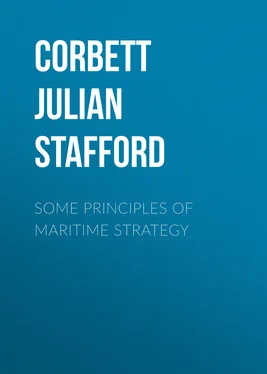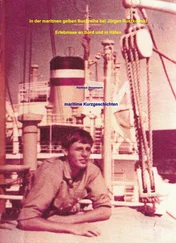Julian Corbett - Some Principles of Maritime Strategy
Здесь есть возможность читать онлайн «Julian Corbett - Some Principles of Maritime Strategy» — ознакомительный отрывок электронной книги совершенно бесплатно, а после прочтения отрывка купить полную версию. В некоторых случаях можно слушать аудио, скачать через торрент в формате fb2 и присутствует краткое содержание. Жанр: military_special, Прочая научная литература, История, foreign_edu, на английском языке. Описание произведения, (предисловие) а так же отзывы посетителей доступны на портале библиотеки ЛибКат.
- Название:Some Principles of Maritime Strategy
- Автор:
- Жанр:
- Год:неизвестен
- ISBN:нет данных
- Рейтинг книги:5 / 5. Голосов: 1
-
Избранное:Добавить в избранное
- Отзывы:
-
Ваша оценка:
- 100
- 1
- 2
- 3
- 4
- 5
Some Principles of Maritime Strategy: краткое содержание, описание и аннотация
Предлагаем к чтению аннотацию, описание, краткое содержание или предисловие (зависит от того, что написал сам автор книги «Some Principles of Maritime Strategy»). Если вы не нашли необходимую информацию о книге — напишите в комментариях, мы постараемся отыскать её.
Some Principles of Maritime Strategy — читать онлайн ознакомительный отрывок
Ниже представлен текст книги, разбитый по страницам. Система сохранения места последней прочитанной страницы, позволяет с удобством читать онлайн бесплатно книгу «Some Principles of Maritime Strategy», без необходимости каждый раз заново искать на чём Вы остановились. Поставьте закладку, и сможете в любой момент перейти на страницу, на которой закончили чтение.
Интервал:
Закладка:
So great indeed is the value of abstract strategical study from this point of view, that it is necessary to guard ourselves against over-valuation. So far from claiming for their so-called science more than the possibilities we have indicated, the classical strategists insist again and again on the danger of seeking from it what it cannot give. They even repudiate the very name of "Science." They prefer the older term "Art." They will permit no laws or rules. Such laws, they say, can only mislead in practice, for the friction to which they are subject from the incalculable human factors alone is such that the friction is stronger than the law. It is an old adage of lawyers that nothing is so misleading as a legal maxim, but a strategical maxim is undoubtedly and in every way less to be trusted in action.
What then, it will be asked, are the tangible results which we can hope to attain from theory? If all on which we have to build is so indeterminate, how are any practical conclusions to be reached? That the factors are infinitely varied and difficult to determine is true, but that, it must be remembered, is just what emphasises the necessity of reaching such firm standpoints as are attainable. The vaguer the problem to be solved, the more resolute must we be in seeking points of departure from which we can begin to lay a course, keeping always an eye open for the accidents that will beset us, and being always alive to their deflecting influences. And this is just what the theoretical study of strategy can do. It can at least determine the normal. By careful collation of past events it becomes clear that certain lines of conduct tend normally to produce certain effects; that wars tend to take certain forms each with a marked idiosyncrasy; that these forms are normally related to the object of the war and to its value to one or both belligerents; that a system of operations which suits one form may not be that best suited to another. We can even go further. By pursuing an historical and comparative method we can detect that even the human factor is not quite indeterminable. We can assert that certain situations will normally produce, whether in ourselves or in our adversaries, certain moral states on which we may calculate.
Having determined the normal, we are at once in a stronger position. Any proposal can be compared with it, and we can proceed to discuss clearly the weight of the factors which prompt us to depart from the normal. Every case must be judged on its merits, but without a normal to work from we cannot form any real judgment at all; we can only guess. Every case will assuredly depart from the normal to a greater or less extent, and it is equally certain that the greatest successes in war have been the boldest departures from the normal. But for the most part they have been departures made with open eyes by geniuses who could perceive in the accidents of the case a just reason for the departure.
Take an analogous example, and the province of strategical theory becomes clear at once. Navigation and the parts of seamanship that belong to it have to deal with phenomena as varied and unreliable as those of the conduct of war. Together they form an art which depends quite as much as generalship on the judgment of individuals. The law of storms and tides, of winds and currents, and the whole of meteorology are subject to infinite and incalculable deflections, and yet who will deny nowadays that by the theoretical study of such things the seaman's art has gained in coherence and strength? Such study will not by itself make a seaman or a navigator, but without it no seaman or navigator can nowadays pretend to the name. Because storms do not always behave in the same way, because currents are erratic, will the most practical seaman deny that the study of the normal conditions are useless to him in his practical decisions?
If, then, the theoretical study of strategy be approached in this way—if, that is, it be regarded not as a substitute for judgment and experience, but as a means of fertilising both, it can do no man harm. Individual thought and common-sense will remain the masters and remain the guides to point the general direction when the mass of facts begins to grow bewildering. Theory will warn us the moment we begin to leave the beaten track, and enable us to decide with open eyes whether the divergence is necessary or justifiable. Above all, when men assemble in Council it will hold discussion to the essential lines, and help to keep side issues in their place.
But beyond all this there lies in the theory of war yet another element of peculiar value to a maritime Empire. We are accustomed, partly for convenience and partly from lack of a scientific habit of thought, to speak of naval strategy and military strategy as though they were distinct branches of knowledge which had no common ground. It is the theory of war which brings out their intimate relation. It reveals that embracing them both is a larger strategy which regards the fleet and army as one weapon, which co-ordinates their action, and indicates the lines on which each must move to realise the full power of both. It will direct us to assign to each its proper function in a plan of war; it will enable each service to realise the better the limitations and the possibilities of the function with which it is charged, and how and when its own necessities must give way to a higher or more pressing need of the other. It discloses, in short, that naval strategy is not a thing by itself, that its problems can seldom or never be solved on naval considerations alone, but that it is only a part of maritime strategy—the higher learning which teaches us that for a maritime State to make successful war and to realise her special strength, army and navy must be used and thought of as instruments no less intimately connected than are the three arms ashore.
It is for these reasons that it is of little use to approach naval strategy except through the theory of war. Without such theory we can never really understand its scope or meaning, nor can we hope to grasp the forces which most profoundly affect its conclusions.
PART ONE
THEORY OF WAR
CHAPTER ONE
THE THEORY OF WAR
The last thing that an explorer arrives at is a complete map that will cover the whole ground he has travelled, but for those who come after him and would profit by and extend his knowledge his map is the first thing with which they will begin. So it is with strategy. Before we start upon its study we seek a chart which will show us at a glance what exactly is the ground we have to cover and what are the leading features which determine its form and general characteristics. Such a chart a "theory of war" alone can provide. It is for this reason that in the study of war we must get our theory clear before we can venture in search of practical conclusions. So great is the complexity of war that without such a guide we are sure to go astray amidst the bewildering multiplicity of tracks and obstacles that meet us at every step. If for continental strategy its value has been proved abundantly, then for maritime strategy, where the conditions are far more complex, the need of it is even greater.
By maritime strategy we mean the principles which govern a war in which the sea is a substantial factor. Naval strategy is but that part of it which determines the movements of the fleet when maritime strategy has determined what part the fleet must play in relation to the action of the land forces; for it scarcely needs saying that it is almost impossible that a war can be decided by naval action alone. Unaided, naval pressure can only work by a process of exhaustion. Its effects must always be slow, and so galling both to our own commercial community and to neutrals, that the tendency is always to accept terms of peace that are far from conclusive. For a firm decision a quicker and more drastic form of pressure is required. Since men live upon the land and not upon the sea, great issues between nations at war have always been decided—except in the rarest cases—either by what your army can do against your enemy's territory and national life or else by the fear of what the fleet makes it possible for your army to do.
Читать дальшеИнтервал:
Закладка:
Похожие книги на «Some Principles of Maritime Strategy»
Представляем Вашему вниманию похожие книги на «Some Principles of Maritime Strategy» списком для выбора. Мы отобрали схожую по названию и смыслу литературу в надежде предоставить читателям больше вариантов отыскать новые, интересные, ещё непрочитанные произведения.
Обсуждение, отзывы о книге «Some Principles of Maritime Strategy» и просто собственные мнения читателей. Оставьте ваши комментарии, напишите, что Вы думаете о произведении, его смысле или главных героях. Укажите что конкретно понравилось, а что нет, и почему Вы так считаете.












